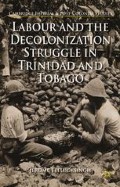Abstract
After decades of agitation for constitutional reform, the Colonial Office in 1924 granted limited concessions for the first instalment of representative government in Trinidad and Tobago. Among the 25 members in the Legislative Council, there were provisions for 12 officials including the Surgeon General, the Treasurer, the Director of Education, the Collector of Taxes, the Attorney General and the Protector of Immigrants. To these were added five unofficials nominated by the Governor from the business and financial interests and who were supportive of the colonial government. Both officials and unofficials belonged to the upper echelons of society, shared common interests and often voted en bloc in the Legislative Council.
Access this chapter
Tax calculation will be finalised at checkout
Purchases are for personal use only
Preview
Unable to display preview. Download preview PDF.
Notes
Ayearst 79. Gordon K. Lewis, Growth of the Modern West Indies (New York: Monthly Review Press, 1968) 198–199.
Paul K. Sutton, ed., Forged From the Love of Liberty: Selected Speeches of Dr. Eric Williams (Port-of-Spain: Longman Caribbean, 1981) 128.
Teelucksingh withdrew his support for Cipriani after the debate on the Divorce Bill in 1931. The Executive of the TWA had agreed to maintain a low profile in the Divorce controversy between the government and the Catholic Church, the latter being against the Bill. During the debate in the Council, Cipriani was persuaded by the Church and French Creoles to oppose legislation, while Teelucksingh and Roodal voted in support. See Brereton 170. See also Hewan Craig, The Legislative Council of Trinidad (London: Faber and Faber, 1952) 107–120. James 82–100.
Sylvia Moodie-Kublalsingh, The Cocoa Panyols of Trinidad: An Oral Record (London: British Academic Press, 1994) 11.
Hansard 29 October 1926. There were public notices in the press by Snaggs stating that the Workmen’s Compensation, 1926 would come into effect on 1st January 1927. For more on the ordinance see Roy Thomas, The Development of Labour Law in Trinidad and Tobago (Massachusetts: Calaloux Publications, 1989) 15.
Author information
Authors and Affiliations
Copyright information
© 2015 Jerome Teelucksingh
About this chapter
Cite this chapter
Teelucksingh, J. (2015). Labour’s Voices in the Legislative Council, 1925–1938. In: Labour and the Decolonization Struggle in Trinidad and Tobago. Cambridge Imperial and Post-Colonial Studies Series. Palgrave Macmillan, London. https://doi.org/10.1057/9781137462336_5
Download citation
DOI: https://doi.org/10.1057/9781137462336_5
Publisher Name: Palgrave Macmillan, London
Print ISBN: 978-1-349-49901-4
Online ISBN: 978-1-137-46233-6
eBook Packages: Palgrave History CollectionHistory (R0)

